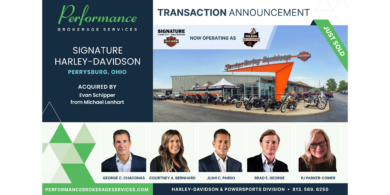New approaches for a struggling economy
By Neil Pascale
Editor
INDIANAPOLIS — The need for the industry to latch on to the belief that it can be more than just a recreational provider and actually a valid transportation option was among the recession-busting strategies discussed in a wide-ranging presentation.
The hour-long speech held on the opening morning of Dealer Expo 2008 in Indianapolis was presented by Paul Leinberger, an expert on brand and marketing strategy whose firm has worked for a number of motorcycle and car manufacturers, including BMW, Harley-Davidson, Toyota, Ford and GM.
“The first thing to remember as we think about how to make more money this year is to think about your marketing differently than you have in the past,” said Leinberger, noting the powersports industry is “not just about sport. It’s not just about recreation. It’s also about transportation.”
Leinberger, the founder of TDi Consulting, spoke to Motorcycle Industry Council (MIC) members about a range of topics that are applicable to not only manufacturers and aftermarket companies, but dealers as well. All of the topics were aimed at dealing with a struggling economy, an economy that might or might not lapse into a recession according to which economic expert is talking.
“Whether (a recession) happens or not doesn’t matter,” Leinberger said. “What does matter is how all of us respond.”
The consultant who has worked for Honda, Yamaha and Kawasaki among other OEMs advises companies to respond by not cutting product development funding, to strive to increase the frequency of shopping by their best consumers and focus on service and product quality.
“In any economic downturn like this, two things are guaranteed to happen,” he said. “Consumers think about quality more than they did before because they do not have as much discretionary income as they did before. They don’t go down in price (when purchasing). They want to go up in price. Whatever you do, do not start cutting prices. The issue is quality, quality, quality.
“After quality, it’s service, service, service. The better the service and the better the quality, the better you will come out of this recession.”
The economic downturn does present some opportunities, Leinberger says, especially in how the industry presents itself. The idea of showcasing motorcycles as more than recreational vehicles is something the industry “needs to stop talking about and start doing something about,” Leinberger said. “Why? Because the price of oil is not going to go down.
“Yes it’s true that oil prices do fluctuate, and it’s also true that we’re not running out of oil.”
But he says the long-term trend for oil prices is up, with some experts believing within two years the average price of a barrel of oil will be $170. Just days after the speech, oil barrel prices reached a historic high of more than $100.
“In an environment where oil is above $100 (a barrel), the opportunity for selling bikes increases dramatically,” Leinberger said.
Consumer sentiment, however, has thus far been lukewarm on that subject. Fifty percent of consumers surveyed by J.D. Power and Associates in 2007 said fuel economy is “somewhat important.” The more than 8,000 new bike buyers surveyed, however, did put more importance on the subject than in the previous-year study.
Besides potentially broadening the market by touting its transportation qualities, Leinberger says innovation is another key to combating a challenging economy. Companies must continue to invest in product development, he says.
“This is not the time to slow down or stop,” Leinberger said. “Why? Because everybody around you is going to slow down or stop. That puts you in a much better position than all of your competitors.”
Plus, the fact is industry manufacturers are not just competing with each other for key demographics, like women and younger consumers. These consumers that walk into dealerships have retail expectations “the likes of which we’ve never seen before,” Leinberger said. “They are not comparing you to some other (industry) manufacturer or your competitor, they are comparing you to the very best experience they have ever had in every single category. Today every one of us is competing against Apple and the iPhone.”
And not only in terms of the retail experience, but the squeezed discretionary spending. Leinberger highlights a couple of areas where the industry should focus on to capture this spending, including shopping frequency and marketing.
“I want all of us to spend a day with at least one of our customers,” Leinberger said, noting this should not happen in a focus group environment but one in which the consumer dictates the events of the day.
“See how they live their life and see what you learn,” he said. “You’d be surprised at the kinds of things that can come out of a very simple thing like that. Sometimes big innovations come out of simple things.”
Another simple thing: Focus on your best customers. Leinberger said reaching out to your best customers more often “is a huge opportunity in a slow economy.” He cited a retail program the multimedia company Borders has started that reaches out to consumers via e-mail. The e-mail includes time-specific coupons that seek to drive consumers to the store more often.
The e-mail program is part of the online presence that companies, no matter what the industry, must have, Leinberger says. He advises companies to adopt blogs for their Web sites and to add user ratings for any product on their site. “We now come to expect user ratings on every product,” he said.
“Make your digital strategy the center of your business,” Leinberger said. “It’s not something you can do tomorrow, it’s not something that if you have time, let’s do it. It’s got to be the center of your business.”




